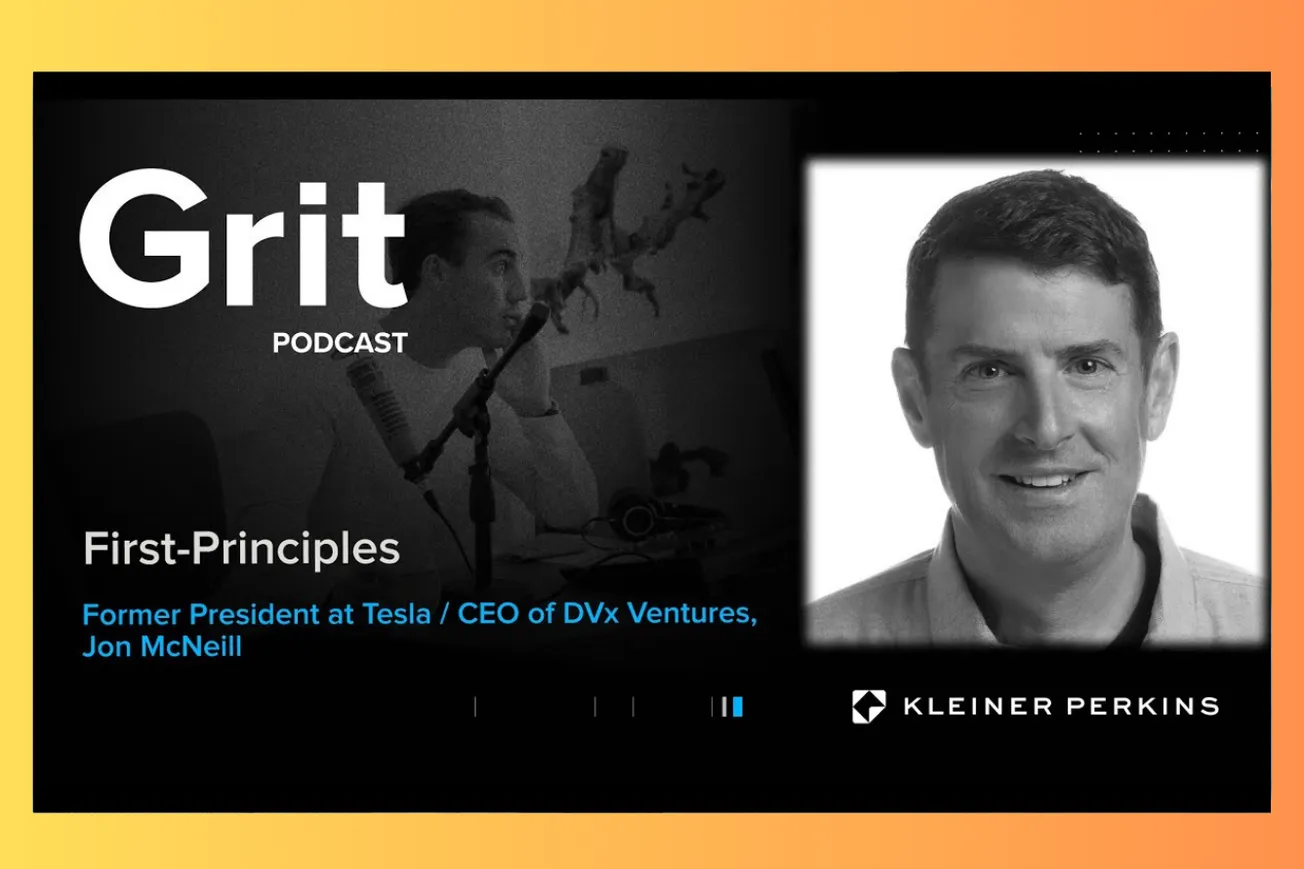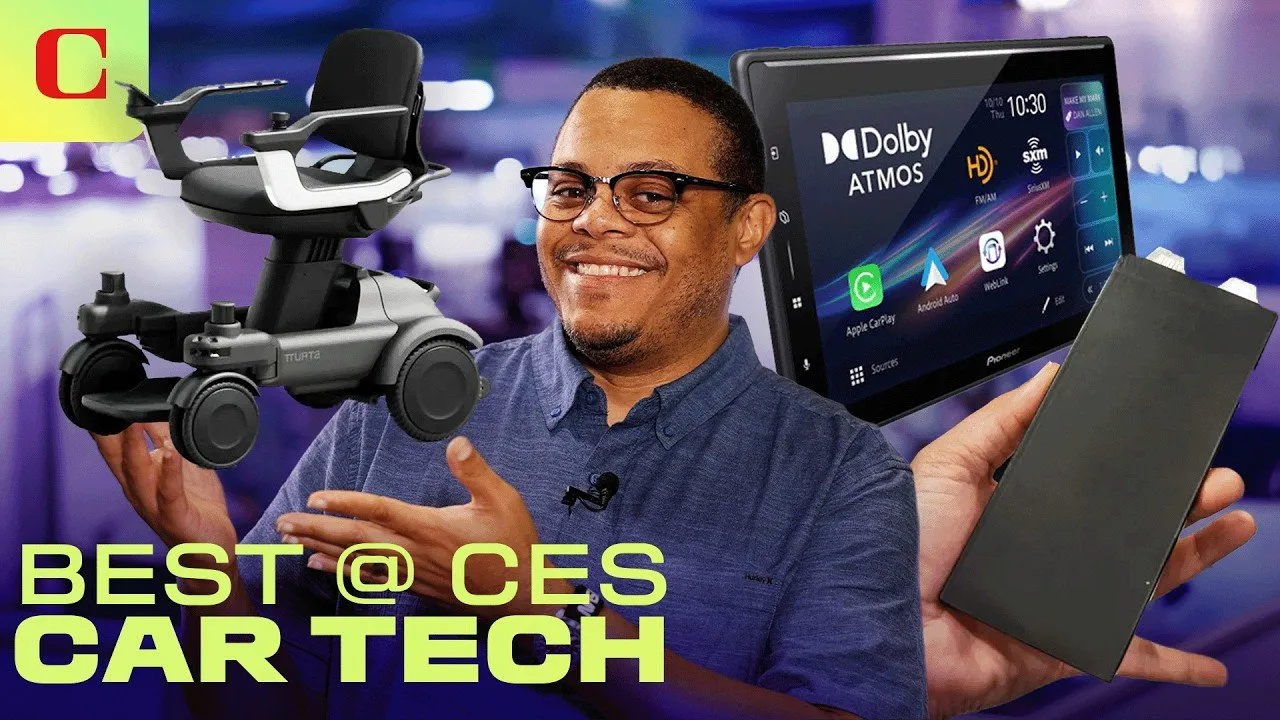Table of Contents
Tesla's former president Jon McNeill reveals how he decoded Elon Musk's leadership style, why he spent 20% of his time with frontline workers, and the disciplined method behind building seven companies at DVx Ventures.
Jon McNeill's journey from six serial startups to Tesla president to venture firm founder demonstrates that simplification beats complication, frontline workers hold crucial insights, and sustainable business models require positive gross margins before scaling.
Key Takeaways
- The 20% rule - spending one day weekly with frontline workers - provides pattern recognition and solutions that executives miss from their offices
- Simplification is an unfair competitive advantage because while anyone can complicate problems, very few people can distill complex issues to digestible components
- Elon Musk operates as "our generation's Da Vinci" with exceptional breadth across disciplines and ability to turn ideas into reality through first-principles thinking
- "Make them talk about you at dinner tonight" became Tesla's two-hour training philosophy that replaced 30-day programs during Model 3 scaling challenges
- Bad news must come first in high-stakes hardware businesses - delays compound logarithmically when cash is limited and manufacturing timelines are critical
- World-class talent requires evidence of actual impact rather than impressive credentials - focus on who did the work versus who claims credit for achievements
- Hyperscaling and "blitzscaling" models fail without positive gross margins of at least 50% before pouring growth capital into customer acquisition
- Product differentiation prevents commoditization - companies that compete purely on price enter destructive races to the bottom that destroy long-term value
Timeline Overview
- 03:46–06:12 — Elon's Twitter Acquisition Strategy: Why buying Twitter wasn't surprising given Elon's heavy usage and product vision, plus decisive cost-cutting driven by debt obligations
- 06:12–10:15 — Rural Nebraska Entrepreneurship: Growing up poor with a father who pushed independence, working derivatives trading to pay for Northwestern, learning problem-solving from farming
- 10:15–15:55 — Intentional Family Relationships: Leaving companies at 4:30 PM to coach kids' sports, annual father-child trips, fighting entrepreneurial all-consuming tendencies
- 15:55–18:55 — Learning from Scott Cook: Seeking vertical mentors 10-20 years ahead, absorbing Intuit's user experience methodologies and "follow me home" research techniques
- 18:55–24:56 — Joining Tesla and Decoding Elon: Working free for summer 2015, discovering test drive follow-up failures, learning Elon's communication preferences around bad news
- 24:56–29:54 — The Neuralink and Boring Company Origins: Hong Kong trip where brain-computer interface and tunneling companies were conceived within days through problem identification
- 29:54–35:57 — Model X Manufacturing Hell: Falcon Wing door alignment problems, sleeping in factories, cross-functional problem solving with quarter's worth of cash remaining
- 35:57–41:05 — Pressure and Team Building: Using running as mental space creation, existential moments as entrepreneur training, building Special Forces culture through shared struggle
- 41:05–45:37 — World-Class Talent Recruitment: Final interview requirements for managers, evidence-based assessment of actual impact, cultural fit evaluation beyond capability
- 45:37–50:47 — Trust Building and Communication: Elon's preference for early bad news delivery, first-principles problem solving, Special Forces mentality versus regular army intensity
- 50:47–54:27 — Tesla's Training Revolution: "Make them talk about you at dinner tonight" philosophy, two-hour training replacing 30-day programs, magical customer experience creation
- 54:27–57:08 — Simplification as Competitive Advantage: Rural problem-solving origins, boiling problems to essential elements, communication clarity as measurement of understanding depth
- 57:08–1:00:36 — The 20% Frontline Rule: Spending one day weekly with customer-facing employees, "if you had my job for a day" question, rapid engineering fixes from recorded feedback
- 1:00:36–1:08:00 — Lyft's Hyperscaling Lessons: Commoditization through price competition, illusory market share gains, path to profitability demands from public investors
- 1:08:00–END — GM Board and DVx Method: Mary Barra's hardware-to-software transformation, Sutter Hill-inspired company creation methodology, seven companies launched with external validation
The 20% Rule: Learning from the Front Lines
Jon McNeill's most powerful leadership insight came from Japanese manufacturing principles: "The frontline worker knows, so your job as the leader is to go ask humbly." This evolved into his "20% rule" - spending one day weekly with customer-facing employees across service centers, support teams, and retail stores worldwide.
The methodology was simple but transformative. "When I come, I'm going to ask a question: if you had my job for a day, if you had the keys, what are the two things you would do to make this place better?" Workers came prepared with specific, actionable feedback that executives never heard in boardrooms.
- Frontline workers interact daily with customer pain points that executives miss from their offices
- Pattern recognition emerges from systematic weekly visits across different locations and functions
- Recording feedback on iPhone and sharing directly with engineering teams creates rapid improvement cycles
- Engineers respond immediately to customer frustration because they hate hearing their code drives people crazy
The approach created positive feedback loops where frontline employees saw their suggestions implemented quickly, encouraging deeper engagement. "People on the front line would get encouraged - they're like 'wow, they're doing something with this feedback, stuff's getting better' - and then that would start a flywheel of real positive momentum."
Simplification as Unfair Advantage
McNeill identifies simplification as perhaps the most valuable executive skill. "Everybody can complicate. Very few people can simplify. If you can simplify then you can boil a problem down to digestible components and solve it." This ability traces back to his rural Nebraska upbringing where practical problem-solving was essential for survival.
His framework for developing simplification skills involves constant self-assessment: "If you've boiled a problem down to its essential elements... you know when you've got the problem boiled down to those essential elements and when you don't." Communication clarity becomes the test - inability to explain simply indicates incomplete understanding.
- Rural problem-solving background provided foundation for cutting through complexity to core issues
- First-principles thinking, used by both Elon Musk and physicists, focuses on essential elements rather than assumptions
- Communication clarity serves as measurement tool - if you can't explain simply, more work is needed
- Calm problem-solving approach learned from father and grandfather during farm equipment failures
The skill becomes particularly valuable in high-pressure situations where time constraints demand rapid problem identification and solution implementation. McNeill's experience sleeping in Tesla factories while solving Falcon Wing door alignment issues exemplified this approach under extreme pressure.
Decoding Elon Musk: "Our Generation's Da Vinci"
McNeill's initial assessment of working with Elon evolved from expecting "our generation's Thomas Edison" to realizing he might be working for "our generation's Da Vinci" due to Musk's exceptional breadth across disciplines. "This guy is so broad and so gifted at being able to take ideas into reality."
The key to successful collaboration involved understanding Musk's communication preferences and problem-solving style. "Bad news has to come first and then we'll hop into problem-solving mode, but if bad news gets delayed it only gets worse and it compounds, sometimes logarithmically."
- Breadth across multiple disciplines combined with execution ability distinguishes Musk from pure thinkers
- First-principles thinking applied consistently across engineering, manufacturing, and business challenges
- Problem identification leads immediately to action rather than prolonged analysis phases
- Trust building requires early communication of problems with proposed solution approaches
The Hong Kong trip that spawned both Neuralink and The Boring Company within days illustrated Musk's rapid processing from problem identification to company formation. "He looks for problems and then immediately goes into action very uniquely." This speed demanded team members who could match the pace and intensity.
Manufacturing Hell and Team Building
Tesla's Model X production crisis created the kind of existential moment that defines company culture and leadership capability. With only a quarter's worth of cash remaining and hundreds of cars piling up due to Falcon Wing door alignment problems, the leadership team essentially moved into the factory.
"We literally were in the factory sleeping in the factory trying to figure this out... that factory runs three shifts and so it's not like you could identify the problem and get it solved by the time the next shift started." The vexing nature of the problem - it would move around between shifts - required continuous presence and iteration.
- High-stakes hardware problems demand immediate attention when cash runway is limited
- Cross-functional collaboration eliminates traditional titles and hierarchies during crisis situations
- Sleeping in factories becomes necessary when problems span multiple manufacturing shifts
- Revenue recognition only occurs when cars leave delivery centers, creating cash flow urgency
The experience created lasting bonds among team members who shared the pressure. "There's a closeness that gets developed not only amongst the team that we were working with but the workers that we were working with in the factory." This intensity became part of Tesla's culture - not regular army, but Special Forces with corresponding camaraderie and mutual dependence.
"Make Them Talk About You at Dinner Tonight"
Tesla's rapid scaling during Model 3 production created impossible training challenges. Traditional 30-day onboarding programs couldn't accommodate hiring velocity, forcing innovation in employee development. McNeill's team distilled the entire customer experience philosophy into a single memorable phrase.
"We want you to have this magical surprise delight awesomeness kind of experience... make somebody talk about you at dinner tonight. Do something so cool, so creative, so awesome that they'll talk about you at dinner tonight." This simple instruction replaced complex training manuals and classroom sessions.
- Rapid scaling demanded two-hour training programs instead of 30-day traditional approaches
- Single memorable phrase captured entire customer experience philosophy more effectively than manuals
- Frontline employees created extraordinary customer experiences through creative interpretation of the principle
- Stories of exceptional service (like fixing cars during childbirth) reinforced the cultural message
The approach worked because it provided clear direction while allowing individual creativity in execution. Service managers would fill customer fridges with groceries, work overnight shifts, and deliver cars to hospitals because they understood the underlying principle of creating memorable experiences worth discussing.
World-Class Talent Identification
Tesla's hiring philosophy focused on evidence of actual impact rather than impressive credentials or company pedigrees. McNeill served as final interviewer for all managers in his organization, while Musk interviewed engineers at various levels to maintain quality standards.
"Tell me what you've done that's world class and then we're going to dive into that because I'm trying to figure out did you do the work or did somebody else do the work and you're kind of claiming credit for it." The process involved deep investigation into problem understanding, solution direction, and team leadership.
- Evidence of world-class impact matters more than prestigious backgrounds or company affiliations
- Deep diving into claimed achievements reveals who actually did the work versus who claims credit
- Reference checking validates stories and identifies patterns of actual contribution
- Cultural fit requires humility and team collaboration ability alongside capability demonstration
The dual filter of capability and cultural fit ensured new hires could operate in Tesla's intense environment. "You're not joining regular army, you're joining Special Forces... to be successful in Special Forces you got to depend on each other and that means the ego's out the door and humility is in."
The Hyperscaling Trap at Lyft
McNeill's experience at Lyft provided crucial lessons about sustainable business models versus venture-funded growth strategies. The rideshare industry's "arms race" mentality created destructive patterns that appeared successful while destroying long-term value.
"When capital is free, there is a lack of discipline that takes place... you could use capital to essentially discount and build share. What they didn't realize was that share was sticky and if you train customers to shop for price they will have both apps open."
- Free capital enables undisciplined growth strategies that appear successful short-term
- Price-based competition creates commoditization rather than sustainable market share
- Training customers to shop on price eliminates brand loyalty and product differentiation
- Public investors demanded path to profitability that venture-backed companies hadn't prepared
The experience reinforced McNeill's conviction that businesses must achieve positive gross margins of at least 50% before scaling capital deployment. "We're not going to take it on the assumption that we're eventually going to figure it out. We're going to figure it out at the beginning and then when we pour dollars in to accelerate, those dollars are going to have really positive returns."
DVx Ventures: Methodical Company Creation
Inspired by Sutter Hill Ventures' systematic approach to company building, McNeill developed a disciplined methodology for creating consumer-focused businesses. The approach treats company creation as a learnable process rather than random inspiration.
"I've often wondered could you create a method to create companies... they had created this method over 20 years... they see an opportunity, they build an MVP themselves, they look for product market fit and go to market fit." DVx applies similar rigor in the consumer space with stage-gate processes and validation requirements.
- Company creation can become systematic methodology rather than ad hoc inspiration
- MVPs built internally allow rapid feedback loops before external team formation
- Stage gates provide disciplined progression through increasing validation requirements
- External venture capital funding serves as validation of concept viability
Seven companies launched in two years with three achieving external funding demonstrates the methodology's effectiveness. The approach combines entrepreneurial experience with venture capital discipline to improve success rates compared to traditional startup formation.
GM's Transformation Challenge
McNeill's appointment to GM's board reflects the auto industry's recognition that software-first mentality has become essential for survival. Mary Barra's leadership during the transition from hardware-first to software-first orientation creates unprecedented challenges for legacy manufacturers.
"Tesla has is a computer on wheels and there's a real software first mentality there... this is an iconic company... but yet they've got to on one vector really change their engineering, on a second vector really change their manufacturing." The transformation requires simultaneous changes across multiple fundamental business dimensions.
- Legacy automakers must transform engineering, manufacturing, supply chain, and go-to-market simultaneously
- Software-first mentality represents cultural shift beyond just technical capability changes
- Iconic American brands carry emotional significance that creates both opportunity and responsibility
- Successful transformation could elevate Mary Barra among history's greatest industry leaders
The board opportunity aligns with Tesla's original mission of accelerating electric vehicle adoption globally. "One of our missions at Tesla was having more electric vehicles on the road, not less. To have an iconic combustion company successfully transition to an iconic electric vehicle company would be an amazing outcome."
Common Questions
Q: How do you maintain work-life balance while building high-intensity companies?
A: Carve out non-negotiable time for family activities like coaching kids' sports, but recognize that being present mentally requires ongoing effort and techniques.
Q: What's the key to working effectively with demanding, high-IQ leaders?
A: Understand their communication preferences (like delivering bad news early), match their intensity level, and focus on problem-solving rather than ego protection.
Q: How do you identify truly world-class talent versus impressive resumes?
A: Dive deep into claimed achievements to understand who actually did the work, look for evidence of real impact, and assess cultural fit alongside capability.
Q: What's wrong with hyperscaling and blitzscaling business models?
A: Without positive gross margins before scaling, companies train customers to commoditize products and create unsustainable unit economics that destroy long-term value.
Q: How do you develop the ability to simplify complex problems?
A: Practice boiling problems down to essential elements, use communication clarity as a test of understanding depth, and work on explaining concepts simply.
Conclusion
Jon McNeill's journey from serial entrepreneur to Tesla president to venture firm founder demonstrates that exceptional leadership requires systematic approaches to learning, problem-solving, and team building. His experience reveals that proximity to frontline workers, disciplined simplification skills, and sustainable unit economics create more lasting competitive advantages than rapid scaling or impressive credentials.
Practical Implications for Leaders
- Implement the 20% Rule: Spend one day weekly with customer-facing employees asking "if you had my job for a day, what would you fix?" - frontline workers hold crucial insights executives miss
- Master Simplification Skills: Practice boiling complex problems to essential elements and use communication clarity as measurement of understanding depth - it's an unfair competitive advantage
- Hire for Impact Evidence: Focus interview processes on actual achievements and who did the work rather than impressive credentials or company pedigrees
- Establish Positive Gross Margins First: Achieve at least 50% gross margins before scaling capital deployment rather than assuming profitability will emerge through growth
- Create Memorable Training Philosophies: Distill complex cultural concepts into simple, memorable phrases that guide employee behavior across all situations
- Build Trust Through Early Bad News: Communicate problems immediately with proposed solutions rather than delaying difficult conversations that compound over time
- Develop Systematic Methodologies: Treat company building, talent development, and problem-solving as learnable processes with repeatable frameworks
- Maintain Family Boundaries: Carve out non-negotiable time for relationships while accepting that mental presence requires ongoing effort and techniques





